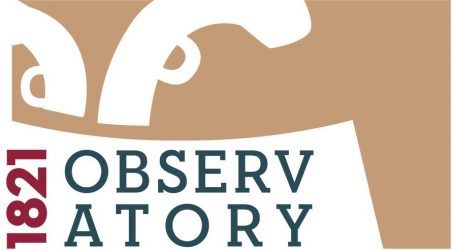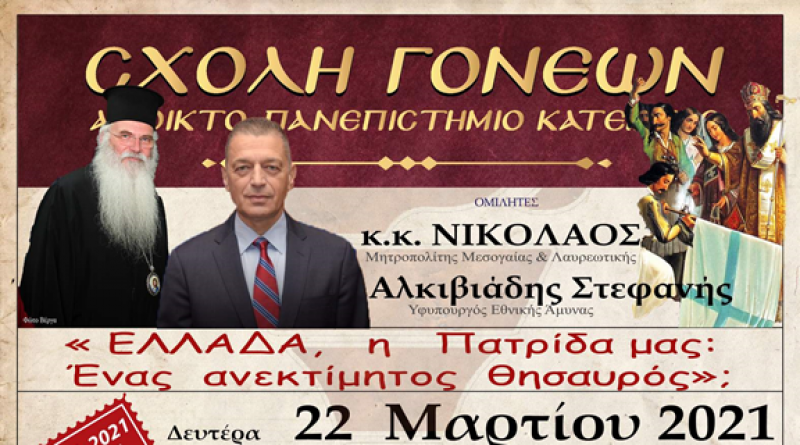Series of talks/events by the Katerini Parents’ School educational cultural association. 1821–2021: Tribute to the bicentenary of the national rebirth
Various local associations from all over Greece marked the bicentenary of the Greek Revolution by organising cultural activities such as discussions and talks, theatrical performances, conferences, music concerts, dance performances, art interventions and exhibitions, historical tours, exhibitions of artefacts, representations and revivals of battles as well as other historical events related to 1821.
Cultural events make an important contribution as they often illustrate unknown aspects of local history, including from the liberation struggle, and underline the contribution of the known and invisible heroes and heroines of various regions of Greece who gave their lives for their country. Katerini Parents’ School, an educational cultural association, stood out for the series of events it organised in 2020 and 2021.
The theme of the events, which took place online from November 2020 to March 2021, covered a wide range of aspects related to the Greek Revolution. Some 32 speakers from Greece and abroad, with different areas of expertise such as medicine, politics, history and the church, delved into the history of 1821 with their presentations, offering important information on the struggle for independence.
Among the themes was the philhellenism movement and the contribution of Russia and expatriate Greeks to the Greek Revolution of 1821. At the same time, the contribution of Americans to the 1821 struggle was highlighted, in particular of the philhellene Americans Edward Everett, Jonathan Peckham Miller and Samuel Gridley Howe. Also, representatives of the Romantic movement, mainly Percival, Halek and Lydia Harlek, strongly supported the national struggle of the Greeks through works of art, moving poems and the sending of aid to Greece. In this way, American philhellenes supported in practice, intellectually and materially, the struggle of the Greeks for their coveted independence.
In addition, the speakers presented texts on pre-revolutionary, revolutionary and post-revolutionary Greece and read texts from 1821 written by the publishers of the newspapers of the time as well as the activists themselves. Important events from the pre-revolutionary period were also analysed, such as the earlier liberation efforts, the beginning of the revolution with the crossing of the Pruth River in Moldavia and Alexandros Ypsilantis’ historical proclamation “Battle for Faith and Homeland”. Among others, the in-depth research of Georgios Metallinos on the Ottoman Empire was highlighted. Also underlined was the catalytic contribution of the church to the national struggle as well as the role of the monks in the revolution.
The series made special mention of the unknown contribution of Mount Athos to the struggle and mainly to the action of Vatopedi Monastery. It also revealed the contribution of doctors and pharmacists. Medicine during the revolution drew on elements from the heritage of ancient Greek medicine, Hellenistic times and Byzantium. Medical care and health were of significant value to the fighters. The speakers referred to prominent doctors of the time who worked in continental Greece, in the Danube principalities, on the Ionian Islands and Crete. Some doctors were also well-known politicians, such as Mavrokordatos, Kolletis, Kapodistrias and Korais. At the same time, the contribution of several anonymous doctors was emphasised.
Another event upheld the heroes of 1821 as timeless models for their virtue, ethos and patriotism. They were described as messengers of the long and unbroken continuity of Hellenism, fighters with a noble mindset who were symbols of principles and values. Other topics expanded on the history of refuges, life in the mountain villages of Pieria during Ottoman rule and the revolution in Macedonia. The sacrifice of the Macedonians helped the Morea and Rumelia to prepare properly, while the contribution of the Philiki Etaireia in the area was also important.
The series commenced with a speech dedicated to Greece. Presenting the programme of the current armed forces to deal with a possible enemy, Deputy Defence Minister Alkiviadis Stefanis stated that the goal today is to continue the glorious historical path of Greece with the values and ideals of the 1821 fighters. Subsequently, the metropolitan of Mesogaia and Lavreotiki, Nikolaos Hatzinikolaou, developed a number of reasons why Greece is considered a blessed place, among them its beauty, climate and wealth.
In conclusion, the series of speeches organised by the Katerini Parents’ School managed to highlight the actions of local heroes, invisible and prominent, and to underline the contribution of Hellenism and the church to the independence struggle. Lesser-known facts were presented through a wide range of topics, such as the contribution of medicine, which may be the basis for further research.
Nikoleta Koutsomichali, PhD candidate, Departement History and Ethnology, Democritus University of Thrace

